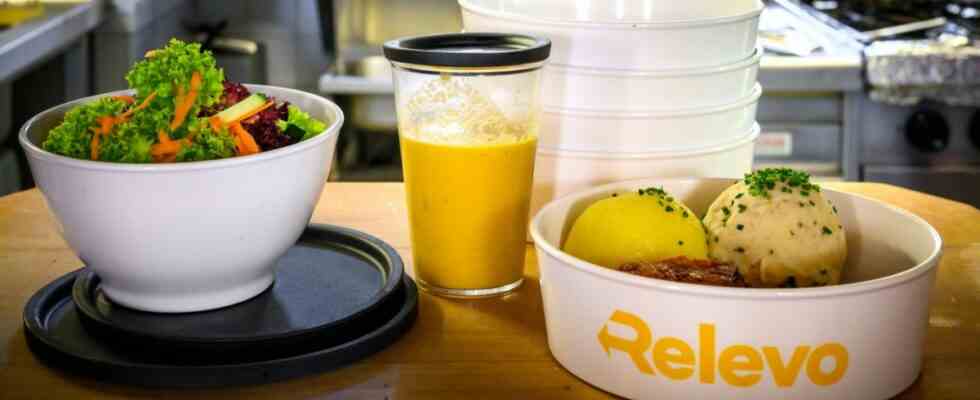Bowls and packaging made of plastic – it has long been known that these are an environmental sin. But especially during the Corona lockdown, the take-away business flourished, and so the call for alternatives became louder and louder. Many companies therefore decided against disposable goods. Since the beginning of the year, a new law has also been intended to counteract the environmentally harmful trend: it requires restaurants and delivery services to offer additional reusable containers or crockery for hire. But how does that work in practice?
Anita Stocker, Chairwoman of the Ebersberg Hotel and Restaurant Association, sees the new legislation in two different ways. On the one hand, it is definitely positive if packaging material is saved, on the other hand, the reusable obligation would result in many additional costs for the already burdened gastronomy: not only that the containers themselves are expensive, the cleaning comes on top of that. “I know from colleagues that some of them let the containers soak for 24 hours,” says Stocker. “You never know what else they were used for.”
According to the head of the association, the need for take-away food has fallen again
According to Stocker’s estimate, three quarters of the restaurants in the district offer a pick-up service. However, some restaurateurs would largely forgo the to-go business because demand has fallen again. Stocker himself also prefers it when people eat directly on site. “You can simply deliver better quality there.” But when it comes to take-away, then right: it is important to her to offer high-quality containers in her inn, even if they are quite expensive.
Anita Stocker, landlady of the Landsham inn of the same name, thinks it’s better if the guests stay to eat.
(Photo: Christian Endt)
However, the landlady does not want government support to be able to comply with the new law: “In the end, we just have to pay the money back anyway. We need tax relief!”, says the association’s chairwoman. She doesn’t expect any noticeable changes from the new law anyway: Most customers would then rather smile at the reusable tableware and stick with the conventional disposable packaging, she says.
There has been a greater awareness of environmental protection, says the craft food boss from Grafing
For Johannes Kullmann, 34, the new law is a step in the right direction. “To really change something, more has to be done,” he says. In its craft food truck in Grafing, Kullmann has been offering its own deposit system for five years, and in the past year and a half the demand for reusable tableware has increased significantly. One notices that people are becoming more aware of environmental protection, according to the restaurateur.
Around 30 percent of customers use the deposit system every day or come with their own containers. However, the craft food truck does not use plastic packaging and cutlery anyway, only those made of sustainable materials such as paper or wood. And Kullmann hopes that the new law will be well received by his colleagues.
At the weekly market, many customers have their Thai curry filled into their own box
Sören Rabe, Thai stand operator at the Ebersberg weekly market, has also been offering reusable packaging for many years, which regular customers in particular are now using more often. As a stand operator, the new law would not oblige him to do so, says Rabe, but it is important to him to offer alternatives that are as environmentally friendly as possible.
Many customers come by with their own containers anyway: the line in front of the small stand is longest at midday, and every second person has a box in their hand. Rabe is currently unable to offer reusable packaging for all of its dishes: “It’s difficult, especially with curry, because it’s important to me that the rice and sauce stay separate.” So you would need two packs for that.
The deposit system still needs to be optimized, demands stand operator Sören Rabe
There were also some difficulties in the search for a suitable deposit system, according to Rabe. Customers often do not want to pay a deposit, especially if it is very high. In some cases, however, the costs would be around ten euros – according to Rabe, far too expensive. In addition, the deposit system runs via an app, and that is complex – both for the customers and for his employees.
So Rabe is not quite satisfied yet. “For me, for example, the requirement that the packaging must always be cleaned by me makes no sense.” If the packaging stays with the same customer, he can simply refill it the next time he visits. “I feel like a lot more people would join if it was cheaper and easier. The system just needs to be tweaked accordingly.”
The reusable packaging requirement for to-go drinks and take-away food has been in effect since January 1st. Gastronomy and delivery services are affected by the new law. Businesses with more than 80 square meters of retail space and more than five employees are obliged to offer reusable packaging or rental crockery. All returned packaging must be cleaned. Small businesses are exempt from the obligation, but must fill containers brought by customers themselves.

